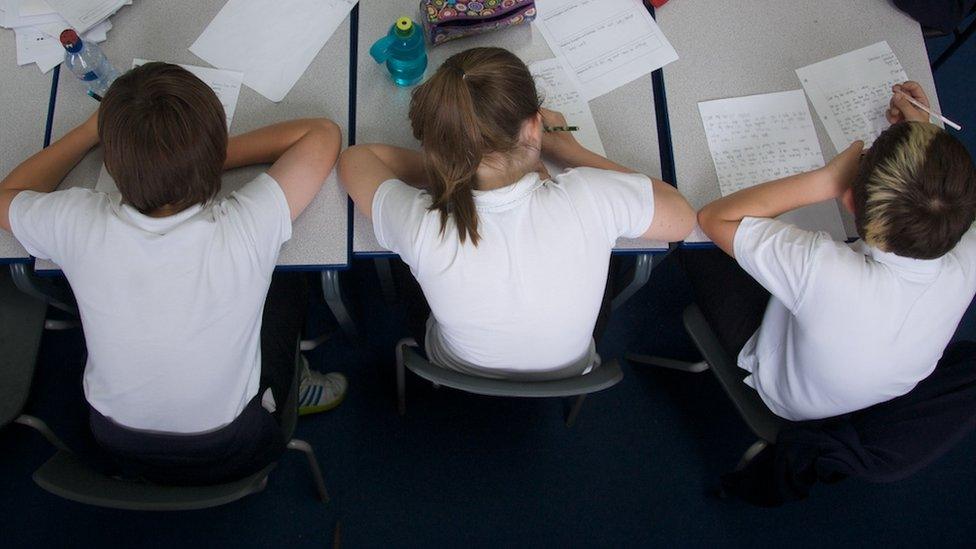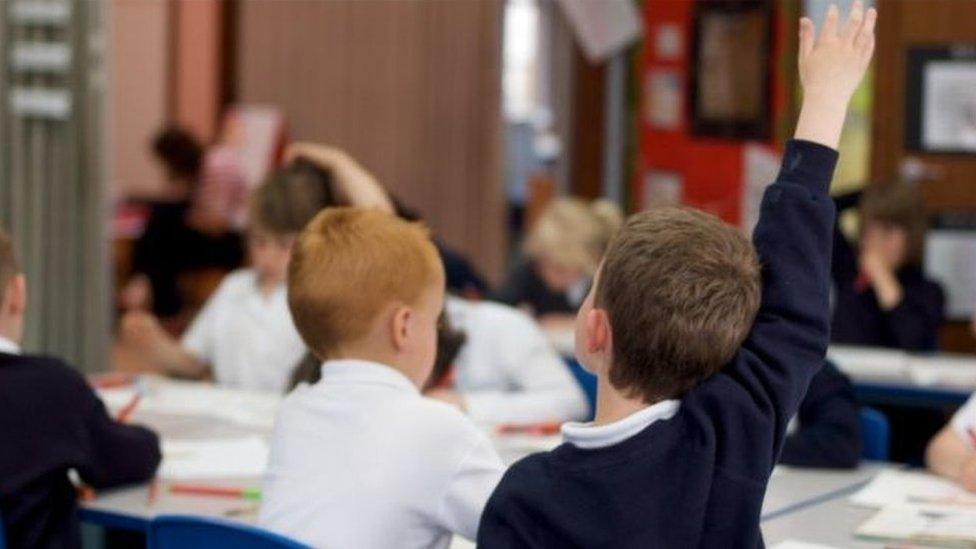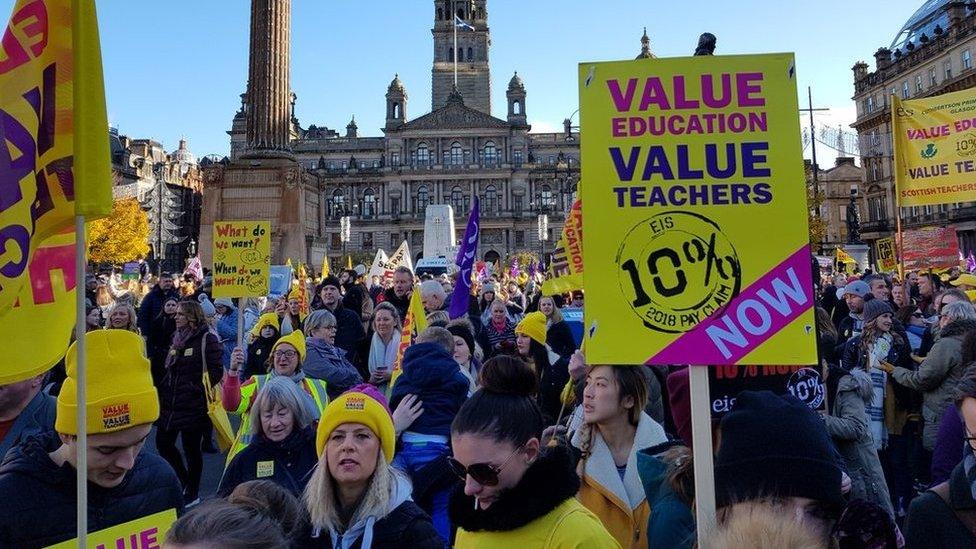Analysis: A profession on the edge over a pay dispute
- Published

The pay dispute has been ongoing since the start of the year
Last week I attended an awards ceremony celebrating the achievements of learners and schools across Scotland.
The stories about the dedication of learners and teachers - and even of lives transformed - can be humbling and inspirational.
I also visited a secondary school to talk to an S3 English class about language and help with their Children in Need fundraising.
The school had just moved to a new building and the staff and students were absolutely buzzing.
But I also had two conversations with teachers elsewhere which were in stark contrast.
Excessive workloads
They were worried about colleagues who were off because of stress, excessive workloads, problems filling vacancies and other important issues facing the profession. Before anyone asks, neither of those two were clockwatchers.
It can seem contradictory - uplifting experiences with learners alongside the all too real worries of teachers as employees. But it is not hard to square this circle.

The marchers held a rally in George Square last month
There is a line to be drawn between the extras a teacher may do because of a love of their job, their academic subject or an awareness of the difference they can make to a young person's life and extra hours which, they may feel, are simply the result of bureaucracy, management or changing goalposts.
Newspaper headlines which talk of a "Crisis in the Classroom" can be seriously misleading.
They may imply that the day-to-day experience in schools is an unpleasant one for children - teachers who actually appear frustrated or demoralised to children, uninspiring lessons, serious indiscipline.
Literacy and numeracy
That is a quite different issue to debating whether policies and initiatives to raise attainment are working or whether changes such as the new qualifications system and Curriculum for Excellence have been for the better.
Some also take a strong view on whether literacy and numeracy are always sufficiently well taught nowadays despite recently renewed guidance emphasising the primacy of the basics.
In my experience, most schools are inspiring places to visit - and I'm not so naive that I wouldn't spot when a show has been put on for the cameras.

Newspaper headlines which talk of a "Crisis in the Classroom" can be seriously misleading
Teachers experiencing a low moment also know the joy of seeing a child make progress or discover their skills and talents.
Any profession will have its share of the burnt-out, the time-servers and those who have grown weary or cynical. Teaching is no different to any other.
Yet the profession stands on the edge of a serious industrial dispute.
On Tuesday, ballots of EIS and SSTA members on whether to accept this year's pay offer close. The unions want a 10% rise.
What one teacher told me privately was telling.
They said: "I'd settle for 3% if I actually worked the hours that were in my contract."
This was from a person who wouldn't think twice about using their spare time to coach a sports team or take a class on a trip to a gallery or museum.
They were, of course, talking about their frustration over the workload.
How much of that was down to their line management, school, local authority or the government is one to discuss.
'Two-day weeks'
Many of these questions will resonate across the public sector - wages, coping with real terms reductions in budgets and change.
The pay dispute has been bubbling away since a 10% pay claim was submitted early this year.
The threat it could lead to industrial action is very genuine but, despite the rhetoric, there has been no headlong charge towards it.

The marchers gathered in Kelvingrove Park in October
Unions hope the very threat of action will be enough.
For those - like me - who had our education disrupted by the long-running teachers dispute of the 1980s, even the prospect of serious industrial action in schools can send a shiver down the spine.
I had several "two-day weeks" at school because of strikes, while extra curricular activities disappeared.
Some teachers felt their dispute was a "white collar equivalent of the miners' strike" given the poor relations between the unions and the Conservative government of the time.
Relations since devolution between the teachers' unions and Scottish ministers have mostly been positive, respectful and constructive.
This is true even when very real disagreements happen - such as over Primary 1 assessments.
Unease and alarm
As a general rule, there is often more to an industrial dispute than the issue at stake.
At the recent national rally on teachers pay, many placards highlighted concerns over workload and bureaucracy.
Some parents will, understandably, be watching these developments with a sense of unease and alarm.
Were the pay campaign to escalate into industrial action, the risk of significant harm to a child's education or broader experience at school is genuine.
But, as things stand, a reality check is needed.
The underlying question is not so much about whether schools are "in crisis".
The question is about how they could be better, whether policies are working and whether some schools are relying on teachers going beyond the call of duty.
But were the pay claim to escalate into a strike or even a lengthy work to rule, the word crisis would not be hyperbole.
- Published20 November 2018
